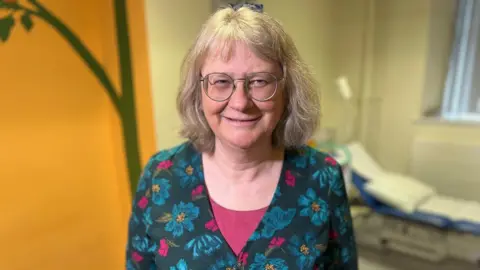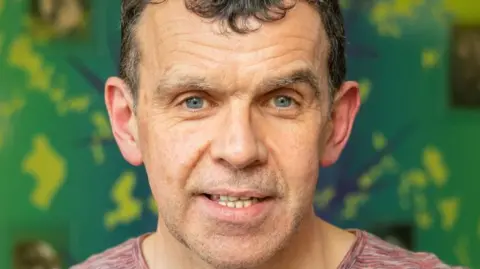North Scotland among highest rates of Huntington's
Northern Scotland has one of the highest rates of Huntington's disease in the world, according to a new study.
Huntington's is a hereditary disorder that slowly damages the brain, affecting the ability to walk, talk, eat, drink, make decisions and live independently. There is currently no cure.
The study confirmed the rate of Huntington's disease in northern Scotland is 14.5 per 100,000 people - more than five times the estimated worldwide rate of 2.71.
The researchers from the University of Aberdeen found there are more than 160 adults living in Grampian, Highland, Orkney, Shetland, and the Western Isles who have the gene but have not been tested.
Every child of someone affected has a 50:50 chance of inheriting the neurodegenerative gene which causes Huntington's.
On average, every person who has been diagnosed with Huntington's disease will have at least another 2.2 relatives who have the gene, meaning there are hundreds of people in northern Scotland who could be considered for effective treatments in the future, researchers said.
Previous studies have mainly looked at the number of people who tested positive for the gene then estimated the number of relatives at risk using statistical modelling.
In the new study, published in a peer-reviewed medical journal, scientists used family tree clinical records to count how many people have a 50:50 chance of having inherited the condition but have not been tested.
It is hoped the findings can help affected families plan for the future and prompt future investment in specialist care.
The chief executive of the Scottish Huntington's Association, Alistair Haw, said specialist services were not an "optional extra" but rather an "absolute necessity".
"Specialist Huntington's services need to be expanded urgently – a message further reinforced by this new and clear evidence which has major implications for health and social care providers throughout Scotland," he said.

The research was led by Prof Zosia Miedzybrodzka of the University of Aberdeen and clinical lead for Huntington's disease at NHS Grampian, alongside Heather Cruickshank, genetic counsellor at NHS Grampian.
They say the decision to be tested for the gene is entirely a personal choice. While some people might want to know if they have inherited the Huntington's gene, others prefer not to unless they develop symptoms.
"Previous work looked at how many people in the area have been tested for Huntington's disease, that is people diagnosed with Huntington's disease signs and those with a gene alteration that will develop the condition in later life," Prof Miedzybrodzka explained.
"However, no-one has properly counted just how many people who haven't been tested yet must have the gene.
"It is crucial that we know this, and that it is accurate, so that health boards can properly plan for care and for treatments when they become available in the future."
Heather Cruickshank said that despite high rates of testing, most people at risk of developing the disease in Scotland have not had a test.
"There is a massive worldwide effort seeking treatments for Huntington's disease," she added.
"Services need to plan to treat these as-yet-uncounted people, as well as those currently diagnosed.
"Regional variations in rates will become more important, including genetic counselling and testing, management, and treatment delivery."
She added: "Having a test remains a free choice for people from Huntington's disease families and our research means that care can be planned for all those at risk, without people who don't want a test having one."
 University of Aberdeen
University of AberdeenBrian Watt, 69, of Hopeman in Moray, is a former whisky distillery manager who received his diagnosis in 2016.
"I knew there was Huntington's disease in my family - my father and my sister were both diagnosed," he said.
"I wasn't sure whether to go ahead with the test, but I am glad I did."
Brian walks his two dogs along Hopeman beach every day.
He believes keeping busy and having an upbeat outlook are vital when living with Huntington's.
"Zosia (Prof Miedzybrodzka) said to me the best way to manage Huntington's disease is with a balance of lifestyle, attitude and medication and I think that is spot-on," he said.
"I try to keep a healthy lifestyle and positive attitude and I'm doing just fine."
 University of Aberdeen
University of AberdeenSandy Patience, 62, of Inverness, was diagnosed with disease in 2017.
He had lost relatives to the disease, and recalls the support of his wife Laura at the time.
"I said to Laura 'this is a game changer in our 20 years together - please can you leave me and live the rest of your life with someone else'.
"But she didn't, because her love for me is as immense as mine for her. We are very very blessed, and I can't imagine life without my soulmate by my side - she picks me up if I am feeling down."
He added: "This is a fantastic opportunity for other people, just like me, to take a big leap forward and consider testing.
"I want everyone to know that testing positive is not the end of the world, it may even be the beginning of better family relationships and countless other positive things."
What is Huntington's disease?
Huntington's disease is an inherited condition that stops parts of the brain working properly and is usually fatal within 20 years of the first appearance of symptoms.
These include difficulty concentrating, depression, stumbling and clumsiness, involuntary jerking of the limbs and body, mood swings and personality changes, problems swallowing, speaking and breathing.
They usually begin between the age of 30 and 50 and gradually get worse over time.
There is currently no cure but treatment can help to deal with some of the symptoms.
Source: NHS website
